The Battle Series
Diana Oh
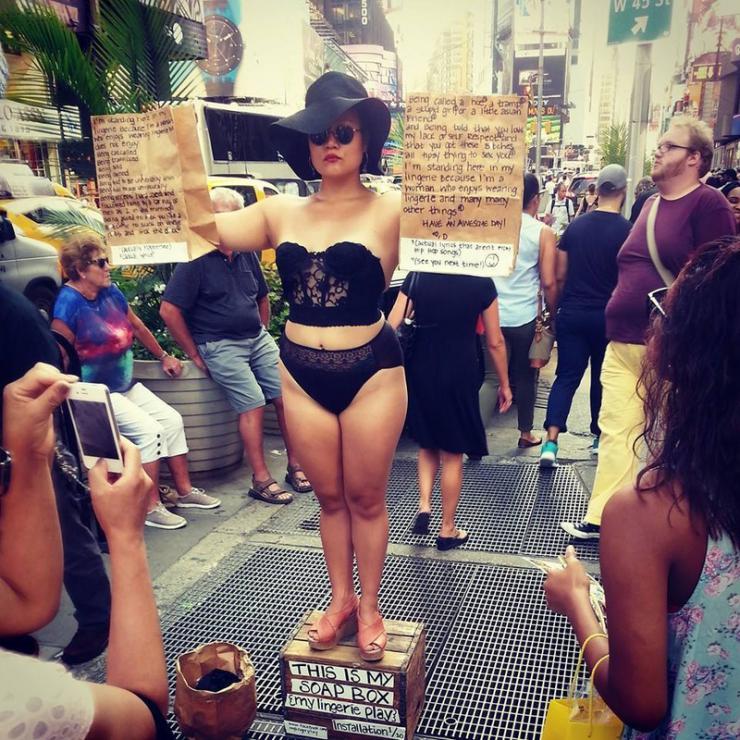
Corey Ruzicano is collecting stories on how artists and humans pick their battles. The Battle Series seeks to answer the question: how do you know what's worth standing up for, and once you've figured that out, how do you do it? How do you do the hard work of growing up?
I graduated from college 288 days ago. Since then I’ve been to seven countries, worked nine jobs, and cried on the subway four times.
This article began as coverage on an international arts festival. Bags packed, high hopes in hand, I’m a world away but I am confronted with all the same injustices of home—inequity of race and class and gender. Only now I’m looking at these big issues as a stranger, away from the business as usual patterns of my home and my life, with a head cleared by crossing 3,257 miles to a stranger’s shore. Over and over I am pricked by reminders of my gender and its imposed meaning; of what it is to be a girl by another country’s standard.
I try to do what I’ve always done: ready to look for the best, I lace up my Pollyanna boots only to find that they don’t fit right. I have taken in the water of all these facts and feelings and crusades and corruptions. I am waterlogged and full to bursting, but have not the bearings or courage or willingness to break open in any one direction.
Probably I’m like any twenty-something—totally lost, loving it and hating it, and wondering how to figure out what matters … and very aware of how unqualified I am to be writing an article on anything at which I feel so at sea.
So I’m not writing that. Instead, I’m asking this: Where do I turn my tide? Which battle do I pick? What is to be done and what is mine to do?
In the Facebook age, I spend precious little time on any one issue. I chew through whatever this morning’s Trump headline is, so I can swallow which polar ice cap is melting today without choking on the 120-character piece about who’s barring Syrian refugees. I flit from thing to thing, taking only bite-sized pieces with me, flying full speed ahead because moving forward is safe. I never have to sit with any questions I can’t answer.
It’s time I started flirting with discomfort.
I begin this series in an effort to understand how people make difficult, defining choices in this life and in their art. I am looking for how others have done the hard work of growing up.
The first person I turn to is Diana Oh.
Performance artist and songwriter, Diana is a warrior. She’s fascinating and fierce and funny. I saw her ninth installation of {my lingerie play} at the Lark last month and couldn’t stop thinking, “That’s what courage looks like.” Diana is standing in front of a packed crowd, asking people to call out what people have catcalled them on the streets. Diana is standing up in the face of a world that rolls its eyes at capital-F Feminists. When I think of big, bold bravery, I think of Diana.
Corey: I’m in the weird interstitial place of having gotten a degree in acting but actually feeling more like I’m exponentially more interested in the conversations around work than I am in any one way of being in the work.
Diana: When you’re an actor, I feel like you’re just someone else’s tool. And unless you align yourself within a community of people who get your morals, then you’re just so fucked on so many levels. Once there’s money involved, there’s always going to be a compromise at some level. So you have to pick and choose your shit—
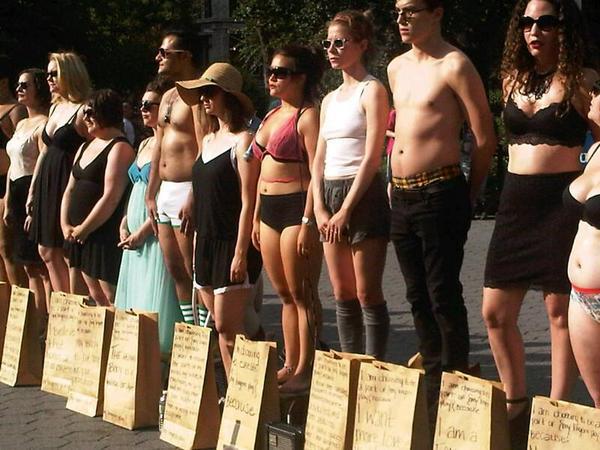
Corey: What you’re willing to stand up for and what you’re willing to go down for.
Diana: And that’s so smart because when there’s no money involved then I can take all the risks. And in terms of creating {my lingerie play} and that big monster, it started as a tiny, tiny seed. It started as: I just want to write a play about my lingerie collection. All I want to do is present a story with a single woman on stage being real with an audience in her underwear. Because normally when women are in their underwear they’re like…
Corey: Playing someone else’s role.
Diana: Exactly, someone else’s fantasy. We’ve dehumanized the whole idea of sex. So I started writing it and it got to a point where I wanted to stop because it felt like, no, this is just speaking to the hundred or so people who already know this, who are going to come to that downtown theatre, and all my friends who are like, thank you for saying something…
Corey: But you’re saying it to someone who already hears it.
Diana: Exactly, and what about all those other people who don’t get this lesson in school? Or what about all those people in Times Square with their little clicky cameras? And it was just like: what is the most fucked up, most popular place I could possibly go—and it became an obsession, something took over me. And when we were doing this again and staging it at the Lark, I hadn’t picked up that script in a year and I was looking at it and I thought, whoa I had a manic episode during those four months where I stood out there in my underwear. I can’t believe I did that. You can’t control it. So to answer your question of how you pick your battles, they pick you.
Corey: Do you have a memory of the buildup to that or a moment when you knew that you had to do something? Often my experience with my peers is that there are so many things to be aware of, and we’re plugged into so many places, that it feels like there’s no space or time to actually sit and ask the unanswerable questions, or sit in the messy or uncomfortable parts. And so I don’t know if you remember what the experience was of finding that seedling or if there was a quotient, for you, that came out of a personal experience?
Diana: Jennifer Conley Darling said, “I want you to write a solo show,” and I said, “I’ve never done that in my life.” And she said, “Great, here’s a deadline.” That’s it, that’s all you need, a deadline and someone to give you permission. You just need one person to give you permission and space. And you get bitten.
I just kept thinking: OK, I need to make something for myself. And part of that was I needed to stand in Times Square in my underwear because I was so angry. And I wrote an email to my friend saying: hey, I have this idea, I can’t shake it off, I don’t know if I’m going to ruin my career or my life or if I’m gonna die or if I’m gonna get attacked but I can’t not, not do this. Because it’s gonna feel too good—will you please come with me and film it. Okay? See you tomorrow at 3.
And we did that. And then my roommate found a soapbox in a hallway, and we had brown paper bags under the sink and the sharpies and the tape were all there and we could afford them and so we did that. We didn’t know what it was going to be or what we were doing. I just gave myself the deadline. We just went where the inspiration went.
I’m aware that I’m a woman. I’m aware that I’m queer. I’m aware that I’m Asian. I’m aware that I’m American. I’m aware that I speak English fluently. I am the image of something that this world has wanted to kill for so long, I can’t hide it. What purpose am I serving by locking myself away—if you own your shit, it gives other people permission to own theirs.—Diana Oh
Corey: It happened so fast! I’m so interested in how the solo performance model became this engine for you.
Diana: I think once you accept that it’s greater than you and once you accept the kumbaya nature of it, then it’s not an ego trip. This is accepting that, if Michael Jackson’s job is to sing and dance, then our job can be the same exact thing. What I also have is that I’m aware that I’m a woman. I’m aware that I’m queer. I’m aware that I’m Asian. I’m aware that I’m American. I’m aware that I speak English fluently. All these things. You are the image of something that this world has wanted to kill for so long, you can’t hide it. What purpose are you serving by locking yourself away—if you own your shit, it gives other people permission to own theirs. George C. Wolfe said something when he spoke at my grad school, he said, “Buoyancy is your weapon.” And that’s what I live by.
Corey: That’s beautiful. It’s another great tool.
Diana: You either think about these things or you don’t. You can call me that feminist actor, but also I’m thinking about diversity all the time. I’m thinking about making sure it’s not all white people in the room. It’s all these things all the time. I’m a woman who went to an all women’s college, I deal with a lot of shit for being a woman living in New York City. And it’s something that our male friends will never understand.
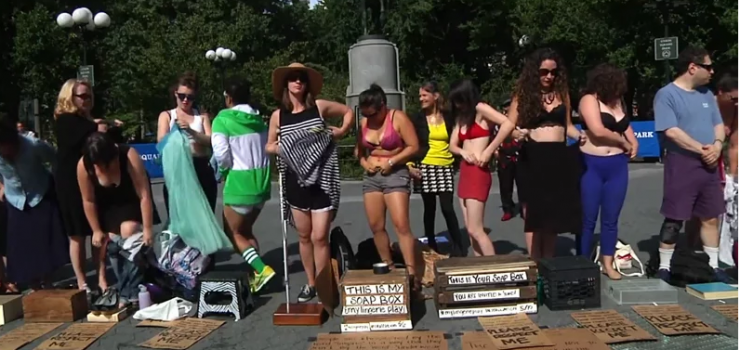
Corey: What I feel is so vital about your work is inviting that awareness. For me, and probably for every woman to have ever walked down the street, a day doesn’t go by when I don’t encounter someone leering or commenting or catcalling on the street or that I’m reminded even in small ways about my status as a woman, and I’m looking for ways to help other people understand without hating anybody.
Diana: Totally. I got a haircut. This is a political act. We’re a visual people and sometimes we need visual aids. When you know people are looking at you, you know you have that power.
In the rooms I’ve been in, when directors talk to men, it’s: yes, and, but when they talk to the women, it’s: yes, but. With men it’s: yes, that’s a cool instinct, and try this, where with women it’s: don’t do that. And when I’m doing my own thing, I don’t deal with it.
Corey: How do you see that manifesting in your art? Are there ways to use it?
Diana: I have this interesting relationship with performing because I’m an actor who takes on other people’s roles, I question it all the time—should I just stop acting? Because you see the gender dynamics in the work, in the rehearsal rooms, in the way that people talk to one another … and maybe this is a generalization, but in the rooms I’ve been in, when directors talk to men, it’s: yes, and, but when they talk to the women, it’s: yes, but. With men it’s: yes, that’s a cool instinct, and try this; where with women it’s: don’t do that. And when I’m doing my own thing, I don’t deal with it.
Corey: Well especially because so often women’s bodies are projected upon anyway. And it’s such a fine line of, how am I using my body to tell a story versus how is someone exploiting my body to further their narrative or their own agenda, which is complicated. I think being an actor is really complicated.
Diana: And every audition has a description: there’s a race description, there’s a gender description. I come across wanting to quit every other month—there are too many rules, there are too many people telling us who we are and who we need to be.
Corey: Has this been a catalyst for wanting to do your own work?
Diana: Absolutely. It goes back to what I was saying about permission—your permission is your playing field. I’ve got a lot of shit to say and doing my own work is like answering a calling, really. Everyone’s always gonna have their own politics. And when you can see that you’re in the minority with your politics because the stance of the white patriarchy has always been clear because they’ve always had the playing field ... when you get the playing field, you run.
Corey: And using that permission as a tool for yourself and others is so important. And learning in what ways can you be irreverent to that and how can you disrupt the narrative without being destructive to yourself and others. It’s a very hard balance to strike. I think ultimately it’s really hard not to get hurt.
Diana: Nobody ever learned anything without being uncomfortable.
Corey: How do you avoid being crushed by the hugeness of some of these issues?
Diana: I have a tremendous defense mechanism where I can just shut it out. For every one person that says you’re bullshit, there are ten other people who support you. And if I didn’t have my community of friends and artists, I would have died. The light would have been snuffed out.
Corey: Are there any tools or influences that have helped you combat some of these things?
Diana: Musicians. I watch documentaries about musicians. It’s because something about the track of being solely an actor felt very shallow to me. When I look at success as an actor, and I see the bullshit that people go through—wearing Spanx and on the cover of a magazine, and I juice-cleansed sixty days before this and my face isn’t mine anymore, and I’m successful and I have an Academy Award to show for it, I think ... this isn’t human life. But I still want to play those roles, I still want to do that work, I’m just not going to slice my face up to do it. So what am I gonna do? I’m gonna make my own pie in the way I know how to make it. I think you have to just learn to be comfortable with innovation and with inventing things a little bit.
Corey: Knowing that making new things is hard and scary.
Diana: Risk, fail, risk again. And I wonder where the body stuff started—maybe with Marilyn Monroe cutting herself up and women seeing that and thinking, it’s that easy. I can buy that too.
Corey: And when you’ve been disenfranchised from having any agency for so long it’s easy to equate looking “the right way” with being lovable because who you are isn’t enough. Which is—wow, dark.
Diana: But awful and true. And with all the political stuff, I also think: whatever happened to creating art because you got inspired in some way and wanted to make it?
Corey: How do you give yourself permission to take up space that isn’t about fighting the battle that you’re fighting?
Diana: With that comes the belief that you have something to offer. So I have to trust that I don’t have to change everything to fit into someone else’s space. I don’t know where my space is, but it’s somewhere. Someone will give me permission again. I think we’re all political. Everybody is. And being a queer person of color...
Corey: You can’t not be. Because of the systemic problems that can only be fixed systemically, you have no other option but to be inherently political by being who you are, whether you want to be or not.
Diana: I don’t even know if I wanted it, I just couldn’t help it. Enough things were happening that I just never felt good.
Corey: Yeah, you speak or you die.
Diana: Exactly. You speak or you die.

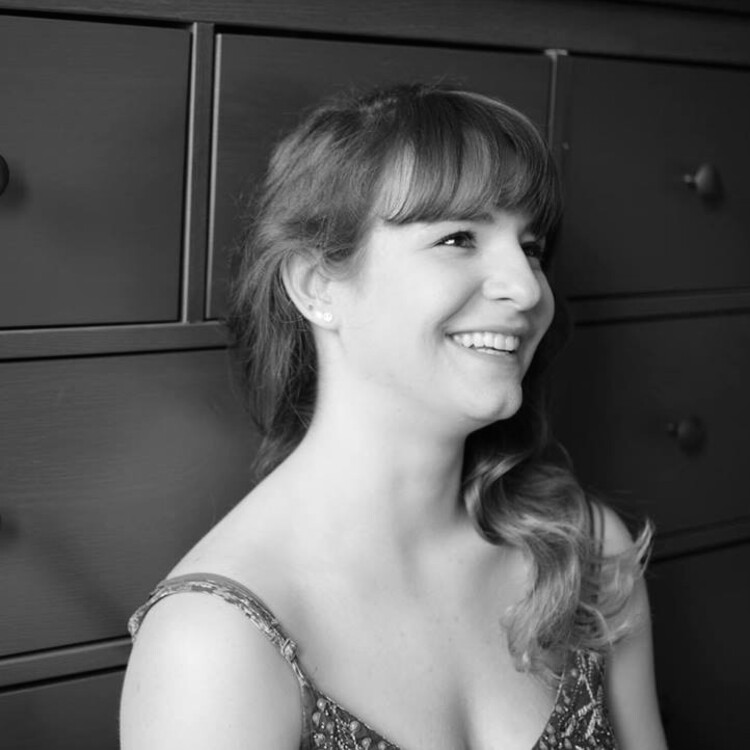
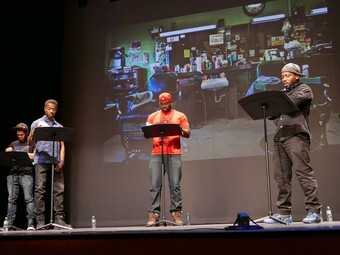


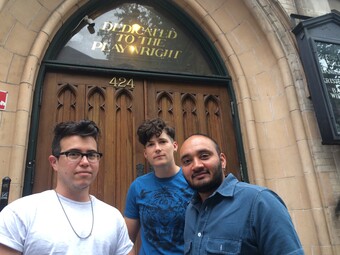



Comments
The article is just the start of the conversation—we want to know what you think about this subject, too! HowlRound is a space for knowledge-sharing, and we welcome spirited, thoughtful, and on-topic dialogue. Find our full comments policy here
Thank you. This is great. I am sharing with students. I know I needed deadlines to start creating my work. So simple, but so helpful.